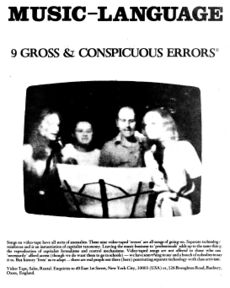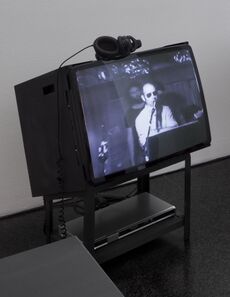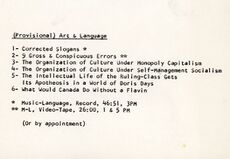Nine Gross and Conspicuous Errors


1976 video by Art & Language, ~22 min
Track listing
Background

Description in The Fox No. 3, May 1976
Songs on video-tape have all sorts of anomalies. These nine video-taped 'errors' are all songs of going-on. Separate technology reinforces and is an instantiation of capitalist taxonomy. Leaving the music business to 'professionals' adds up to the same thing: the reproduction of capitalist formalisms and control mechanisms. Video-taped songs are not offered to those who can 'necessarily' afford access (though we do want them to go to schools) — we have something to say and a bunch of nobodies to say it to. But history 'frees' us to adapt ... there are real people out there (here) penetrating separate technology with class activism. Video-Tape; Sales, Rental.
Release
- May 1976 advertised sales and rentals in The Fox 3
- June 1976 part of exhibition
- In 1994 The Red Krayola sold a small amount of copies on their Japan tour[1]
- Circuit 9 - two excerpts
- Unreleased DVD ~2010
- UbuWeb
Personnel
Art & Language
- Kathryn Bigelow
- Ian Burn
- Christine Kozlov
- Nigel Lendon
- Mel Ramsden
- Paula Ramsden
- Terry Smith
The Red Crayola
- Mayo Thompson - guitar
- Jesse Chamberlain - drums
Writing
- Mel Ramsden - lyrics[2]
- Mayo Thompson - music
Retrospectives
Mel Ramsden, 2019[3]
The performative aspects - I know people keep bringing it up now; Art & Language and performance and drawing and performance. And I'd never thought of the performative aspect of it until we did Nine Gross and Conspicuous Errors which was an absurd performance. [...]
No, there was no rehearsal. There was just a bit of a conversation then invited a few people. But Mayo Thompson had done that already, years and years ago, because the Red Crayola used to have this thing [The Familiar Ugly] which were some fans that used to follow them around and then they came up on the stage and disrupted the performance. But that's in the late 60s. [...]
Well it was just a preposterous thing to do, to speak those kind of lyrics. But it was called Nine Gross and Conspicuous Errors because, I believe, in response to Corrected Slogans in some way because it was done slightly later even though the record wasn't released. But I'd heard some of the tracks. In fact I performed one of the tracks on Corrected Slogans [Penny Capitalists]. Brilliantly, I must say. [...]
Reviews
Frieze
October 13, 2005[4]
Andrew Hunt
[...] two videos And Now for Something Completely Different and Nine Gross and Conspicuous Errors (both 1976), which have a similar lyrical content to the album [Corrected Slogans] and which both contain ironic posturing that thinly masks an awkward energy brought about by the mixture of political anthems and rock and roll. Of the two videos, Nine Gross and Conspicuous Errors best represents this experimental vitality. Unrehearsed songs are performed by groups of unsuspecting participants as well as the knowing core collaborators Art & Language’s Michael Baldwin and Mel Ramsden, with Thompson on guitar and Jesse Chamberlain on drums. Activist slogans, such as ‘we must ferociously attack so called institutionalized egalitarianism – it is a smokescreen, which attempts to replace activist content with liberal structures’, are chanted en masse and played out as theoretical quotations and self-mocking mantras. At one point Ramsden sings the line ‘Marx’s old chestnut “the philosophers know how to interpret the world, the point is to change it” is embedded in the nexus of dialectics’ and Thompson makes a dedication ‘to Ludwig Wittgenstein, who said “you cannot be a philosopher and a Communist at the same time”’. Through visible misunderstandings of each text or acts of insincerity on the performers’ behalf, there’s an inevitable displacement of belief in these videos, where each deliberately inauthentic voice strives for a form of validity. Although the musical backing by The Red Crayola is vital and exciting, the aim, through the unfeasibility of the verbal performances and the lyrics – or the ‘conspicuous errors’ – appears to be to keep the gap between the performer and the text open. This is enforced by philosophical ramblings about the ‘commodification of social relations’ and remarks about language serving a strong managerial role, and interspersed by some expertly amateur routines, with Ramsden, in particular, fluctuating between self-conscious embarrassment – indicating the confusion of the situation – and an overconfidence about his own workmanlike timekeeping. At one point he looks extremely proud of a fellow player who’s so lost she has no idea what line she’s meant to be singing. Baldwin also appears ridiculous in his Travis Bickle sunglasses, growling comedically into the microphone and whistling pointlessly along with Ramsden. [...]








